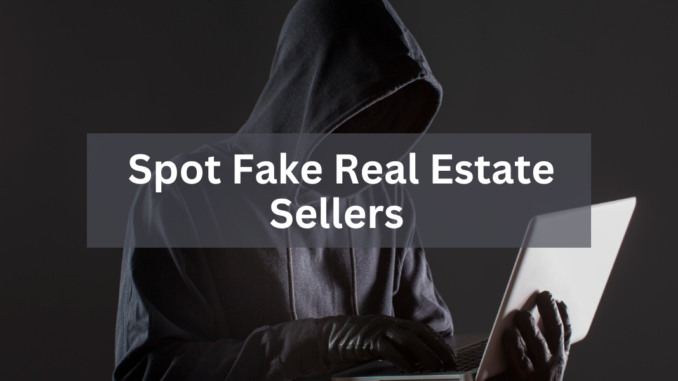
You’re in the market for a new property. You’ve seen a few properties that you like, and you’ve finally reached out to the sellers to get more information. But how can you be sure that they’re the sellers, and not just scammers trying to take advantage of you?
It can be tough to tell whether or not a real estate seller is legitimate. After all, they might have all the required paperwork and licenses. But that’s not to say that there aren’t any warning signs. In this article, we’ll teach you how to spot fake real estate sellers, and we’ll give you some tips on how to avoid real estate fraud.
Contents
What Are Fake Real Estate Sellers?
There are all sorts of fake real estate sellers out there. Some will pretend to be legitimate real estate agents, but they’re just trying to scam you. Others will post homes and land for sale online, but they don’t own the property—and they’ll take your money and run.
How can you spot these scammers? It can be tricky, but there are a few things you can look for. For example, if the seller asks for a lot of money upfront, or if they’re not willing to show you proof of ownership, that’s a red flag. Also, be careful about giving out personal information like your BVN or bank account number.
If something feels wrong, trust your heart and walk away. There are plenty of legitimate real estate sellers out there—you don’t need to deal with anyone who makes you feel uncomfortable.
Common Red Flags to Look For
Now that you know what to look for in a real estate transaction, you can start to spot the red flags that might indicate fraud.
Some common red flags include:
- The seller is not the owner of the property.
- The deed has been altered.
- The seller refuses to provide a title document.
- The selling price is significantly lower than comparable properties in the area.
- The seller pressures you to sign a contract or make a down payment before you have a chance to fully inspect the property.
- Lack of transparency, evasive answers, or refusal to address concerns are red flags.
- Difficulty reaching the developer or decision-makers directly raises concerns.
- The seller does provide incomplete documents, you can read the List of Documents Required for Land Purchase in Nigeria
If you see any of these red flags, be sure to do your due diligence and investigate further before proceeding with the sale. It’s better to be safe than sorry!
How Can I Identify a Fake Real Estate Seller?
Now that you know the red flags of a fake real estate seller, it’s time to learn how to identify them.
The most obvious giveaway is if the seller refuses to show you proof of ownership, such as the title or deed. They may also try to rush you into a sale or claim that there are no other interested buyers. Be especially wary if the seller asks for money upfront or requests that you send funds; these are common scams.
Other signs that you may be dealing with a scammer include poor grammar or spelling mistakes in emails or official documents, and being asked to pay for an inspection or closing costs before you’ve even seen the property. If something looks too good to be true, it probably is—so be sure to do your research before handing over any money.
What Scams Should I Watch Out For?
There are a few scams to watch out for when buying real estate. And it’s important to be aware of them because they can cost you a lot of money.
Some of the most common scams include:
1. Fake listing: This is when someone posts a listing for a property that doesn’t exist. They may even use photos of real property, but the details are all wrong.
2. Bait and switch: This happens when the seller shows you one property, but then tries to sell you another one.
3. Flipping: This is when a seller buys a property to resell it quickly for a higher price. But instead of doing the work themselves, they often use fake or stolen documents to try and make the sale go through.
4. Owner financing: This is when the seller agrees to finance the purchase of the property themselves. But they often require high interest rates or other unfair terms.
Recommended>>>
- Best Places to Buy Land in Lagos
- 17 Things to Know Before Buying Land in Nigeria
- How To Verify Land Titles and Registration In Nigeria
- Best Real Estate Websites To Sell Property Online In Nigeria
- Why Land Banking Could Be Your Next Investment Powerhouse
- Where to buy Land In Nigeria
- Land Sales Agreement (Contract of Sale) in Nigeria
How to Protect Yourself From Real Estate Fraud
There are a few things you can do to protect yourself from real estate fraud.
It’s a good idea to do your research on the property before you commit to anything. Make sure you visit the property in person and that you get a copy of the deed so you can verify that the seller is the actual owner.
You should also run a background check on the seller to see if there are any red flags there. And finally, it’s always a good idea to get everything in writing so you have a paper trail if anything goes wrong.
What to Do if You’ve Been Scammed
If you think you’ve been scammed, the best thing to do is report it to the authorities right away. You can also file a complaint with the police and the Economic Financial Crimes Commission (EFCC).
In addition, you should reach out to an experienced real estate attorney who can help you understand your legal options and rights. If you’ve already signed a contract, an attorney can review the contract to see if any recourse provisions would allow you to get out of the deal.
Lastly, be sure to warn your friends and family about the scammer so they don’t become victims as well.
Conclusion
The best way to protect yourself from getting scammed is to be aware of the warning signs. Remember, if it sounds too good to be true, it probably is. Be suspicious of anyone who asks for too much information upfront, especially if they are asking for your Social Security number or banking information.
If you are planning to buy or sell a home, it’s always a good idea to consult with a real estate agent. A real estate agent will be able to help you navigate the process and will also be able to spot any potential scams.
Remember, if something seems too good to be true, it probably is, and it’s always better to be safe than sorry.
- Follow me on TikTok for quick tips and behind-the-scenes tours
- Subscribe to my YouTube channel for in-depth videos and property showcases
- Follow me on Facebook for updates, listings, and real estate advice


Leave a Reply